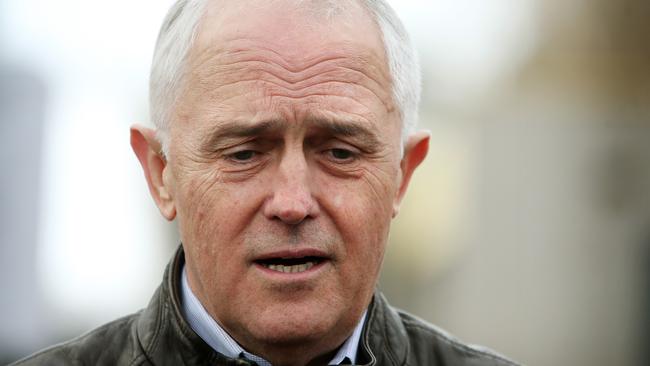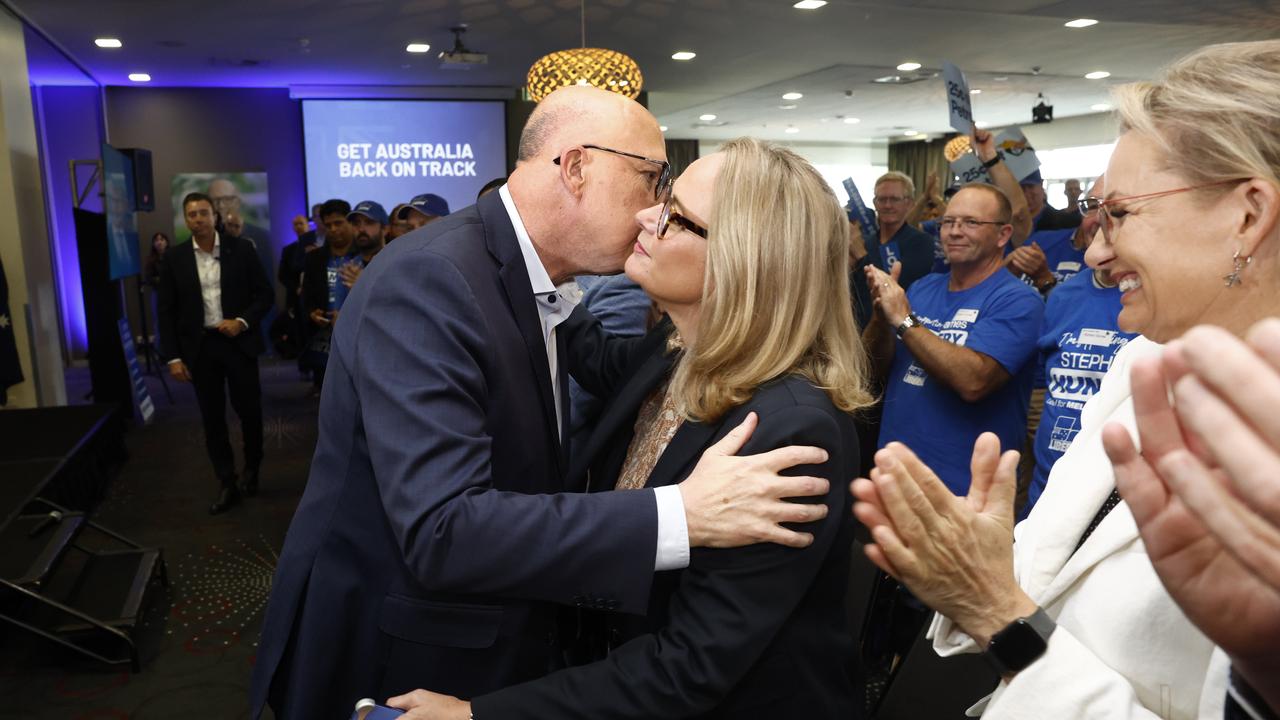Malcolm Turnbull in political death spiral
DATA reveals the PM, once the darling of the online world, is now so toxic that he cannot win no matter what.

THE words may have changed but the song remains the same: One year on from his disastrous cliffhanger election campaign, Malcolm Turnbull is being savaged on virtually every policy he produces.
Extraordinary data obtained by news.com.au reveals the Prime Minister, once the darling of the online world, is now so toxic that even his successes are overwhelmingly piled upon with scorn.
This is despite the fact the issues that decided the election just 12 months ago have been all but completely forgotten and replaced with new hot topics that are still killing the PM.
Not only that, whether he moves to the left or the right with policy announcements, social media appears to condemn him for it — a public sentiment that has been reflected in the Coalition’s appalling showing in the polls.
The research from global data analysis firm Meltwater, commissioned by news.com.au, appears to confirm the long-suspected left-wing and negative bias of social media, however it also points to a crisis in public confidence in the Coalition, which Newspoll currently has lagging 47-53 behind Labor.
It also confirms Labor’s so-called “Medi-scare” campaign destroyed the Coalition at the last election and that it has struggled to regain voter confidence ever since.
The data shows Medicare was overwhelmingly the number one topic during the election campaign, with more than 17,000 mentions on social media in connection with Turnbull and/or his government.
Incredibly, only one per cent of these mentions were positive while a massive 52 per cent were negative and the remaining 47 per cent were neutral. And virtually all the positive comments were generated by Liberal politicians themselves.
“There were very few social posts generated by the public defending the Coalition,” Meltwater found.
The second biggest topic was the NBN, with more than 15,000 mentions in relation to the PM or the Coalition — an issue probably slightly over-represented given the online forum.
Yet once again the sentiment was staggeringly hostile to Turnbull, the former communications minister, with 45 per cent negative, 52 per cent neutral and just three per cent positive.
On both issues there was an almost complete lack of trust with the Coalition, linked back to Tony Abbott’s previous breaches of faith, with a recurring theme that “because the Coalition has a history of broken promises, there is no reason to trust Malcolm’s comments”.
And it is this that is still crippling Turnbull now: Even with an election win (albeit a threadbare one) and a big benevolent budget under his belt, the Prime Minister is caught in a political death spiral.
If he leans to the right, social media commentary overwhelmingly pillories him for it, if he leans to the left, commenters don’t believe he is fair dinkum.
The top three topics in June 2016 were Medicare (44pc), NBN (40pc) and same sex marriage (16pc) – on which the PM’s was judged “unconvincing”.
By contrast, the top three topics in June 2017 were schools funding (44pc), the proposed Adani coal mine (33pc) and terrorism (23pc) and yet the sentiments were eerily the same.
On education, Turnbull has provided an extra $23.5 billion for schools, got the package through the senate and has the full approval of the original Gonski architect, David Gonski himself. Experts, political analysts and commentators have all but unanimously hailed it as one of the PM’s major victories.
And yet even on this number one issue, public sentiment is overwhelmingly against the government, with 52 per cent of online commentary negative compared to just nine per cent positive.
Likewise on terrorism, an issue which traditionally favours conservative and incumbent governments, the public mood is deeply hostile to the Coalition — a sentiment that exactly mirrors Meltwater analysis of online sentiment towards UK Prime Minister Theresa May just before her shock election thumping.
No less than 78 per cent of commentary on terrorism in connection with the government was negative, compared to just two per cent positive. And when Mr Turnbull attempted to be strong in the wake of the Melbourne terrorist attack he was seen as “politicising” the incident.
A key example of Turnbull’s dilemma is the bank levy, which one would think his enemies on the left would find impossible to criticise him for. Yet the issue has a net negative tonality of minus 39.1 per cent, largely driven by revelations the levy would be tax deductible. And so the right condemns the PM for punishing the banks at all and the left condemns the PM for not punishing them enough.
In tennis, the position on the court between the net and the base line is known as “no man’s land” – too far back to get the volley and too far forward to get the bounce. It is a tactical death zone.
Turnbull has done a lot of good recently. His schools funding package is rightly lauded by objective experts and his commitment to fully-funding the National Disability Insurance Scheme is, if anything, even more impressive. Yet the latter did not even rate in the top 10 online issues identified by Meltwater this month, which perhaps tells you everything you need to know about social media.
Indeed, Turnbull’s greatest crime in the last Budget was trying to please everybody on both sides.
In war, of course, “no man’s land” is the name given to the place between trenches where fire from both sides gets your head blown off.
Plenty of good and innocent men died there too.




